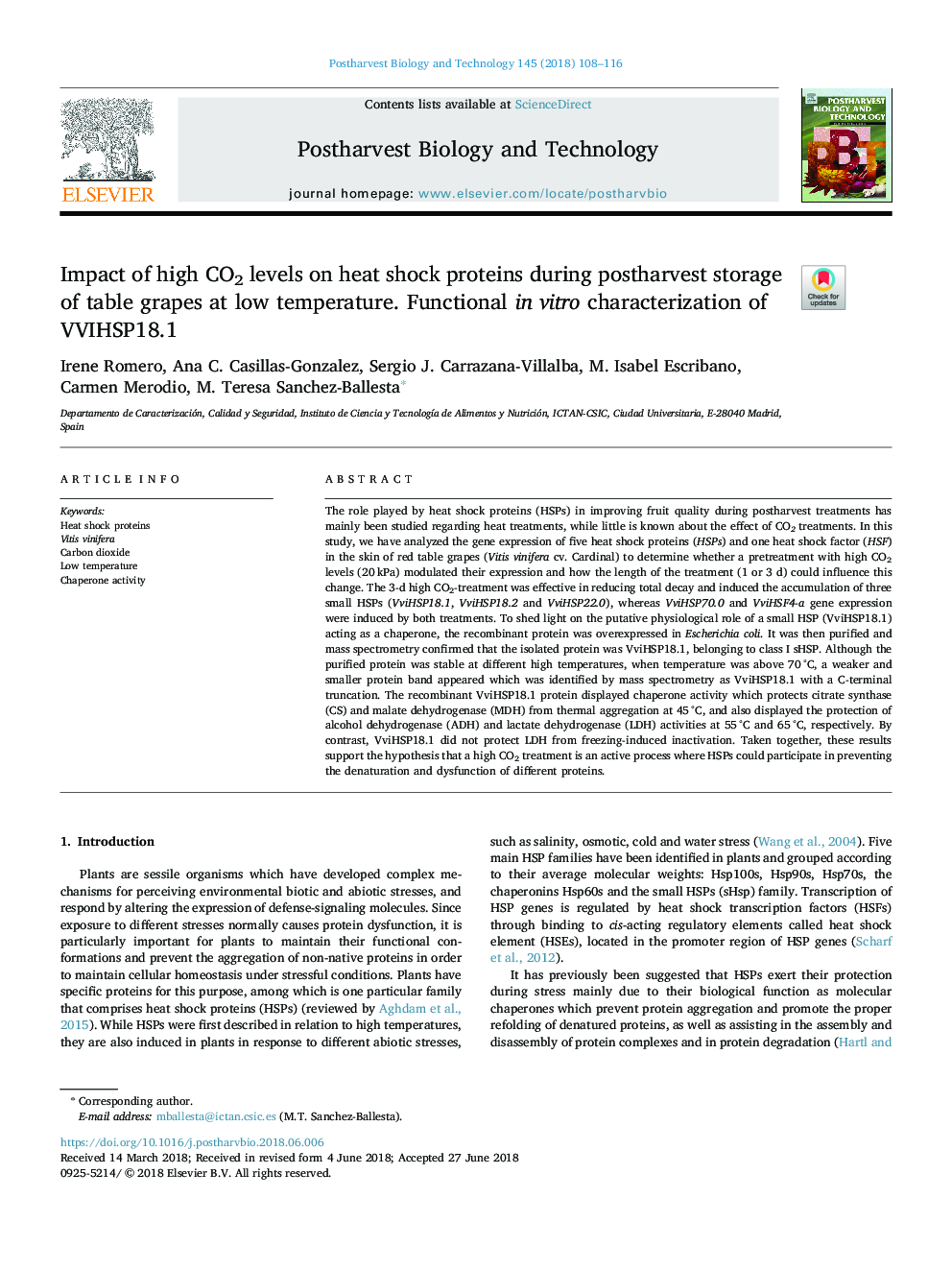| کد مقاله | کد نشریه | سال انتشار | مقاله انگلیسی | نسخه تمام متن |
|---|---|---|---|---|
| 8881782 | 1624949 | 2018 | 9 صفحه PDF | دانلود رایگان |
عنوان انگلیسی مقاله ISI
Impact of high CO2 levels on heat shock proteins during postharvest storage of table grapes at low temperature. Functional in vitro characterization of VVIHSP18.1
دانلود مقاله + سفارش ترجمه
دانلود مقاله ISI انگلیسی
رایگان برای ایرانیان
کلمات کلیدی
موضوعات مرتبط
علوم زیستی و بیوفناوری
علوم کشاورزی و بیولوژیک
علوم زراعت و اصلاح نباتات
پیش نمایش صفحه اول مقاله

چکیده انگلیسی
The role played by heat shock proteins (HSPs) in improving fruit quality during postharvest treatments has mainly been studied regarding heat treatments, while little is known about the effect of CO2 treatments. In this study, we have analyzed the gene expression of five heat shock proteins (HSPs) and one heat shock factor (HSF) in the skin of red table grapes (Vitis vinifera cv. Cardinal) to determine whether a pretreatment with high CO2 levels (20â¯kPa) modulated their expression and how the length of the treatment (1 or 3 d) could influence this change. The 3-d high CO2-treatment was effective in reducing total decay and induced the accumulation of three small HSPs (VviHSP18.1, VviHSP18.2 and VviHSP22.0), whereas VviHSP70.0 and VviHSF4-a gene expression were induced by both treatments. To shed light on the putative physiological role of a small HSP (VviHSP18.1) acting as a chaperone, the recombinant protein was overexpressed in Escherichia coli. It was then purified and mass spectrometry confirmed that the isolated protein was VviHSP18.1, belonging to class I sHSP. Although the purified protein was stable at different high temperatures, when temperature was above 70â¯Â°C, a weaker and smaller protein band appeared which was identified by mass spectrometry as VviHSP18.1 with a C-terminal truncation. The recombinant VviHSP18.1 protein displayed chaperone activity which protects citrate synthase (CS) and malate dehydrogenase (MDH) from thermal aggregation at 45â¯Â°C, and also displayed the protection of alcohol dehydrogenase (ADH) and lactate dehydrogenase (LDH) activities at 55â¯Â°C and 65â¯Â°C, respectively. By contrast, VviHSP18.1 did not protect LDH from freezing-induced inactivation. Taken together, these results support the hypothesis that a high CO2 treatment is an active process where HSPs could participate in preventing the denaturation and dysfunction of different proteins.
ناشر
Database: Elsevier - ScienceDirect (ساینس دایرکت)
Journal: Postharvest Biology and Technology - Volume 145, November 2018, Pages 108-116
Journal: Postharvest Biology and Technology - Volume 145, November 2018, Pages 108-116
نویسندگان
Irene Romero, Ana C. Casillas-Gonzalez, Sergio J. Carrazana-Villalba, M. Isabel Escribano, Carmen Merodio, M. Teresa Sanchez-Ballesta,